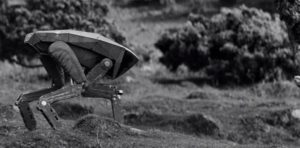If we’re not talking about surviving the zombie apocalypse, chances are we will default to discussing and debating the robot apocalypse. With films such as The Terminator series, I, Robot, and the popular TV show Battlestar Galactica, the pinnacle fight of human creation versus God’s creation is always being reimagined. As we see artificial intelligence developments increasing in scope, the conversation is more popular than ever before, even with evidence that we may not ever see true, sentient artificial intelligence. The subject is what makes an episode like Metalhead, the fifth episode of Black Mirror: Season 4, so timely. And like any good “robot uprising” story, the main focus is placed on us – the humans.
Metalhead, directed by David Slade, appears to be the “black swan” of Black Mirror, taking place in a post-apocalyptic Scottish highlands. The episode is presented in – appropriately enough – a rich black-and-white palette, a stylistic choice that no other episode of Black Mirror has showcased until now. Metalhead tells the story of Bella (played by Maxine Peake), a survivor of the apocalypse that volunteered for a special retrieval mission. Her two comrades, Anthony (Clint Dyer) and Clark (Jake Davies), have also volunteered for the mission, which seems fairly routine at first; travel to an abandoned warehouse, pick up a package, and return back to where they came from with the package intact. What they’re retrieving is intentionally left unexplained, and why they’re on the mission in the first place is even more vague at the start. After Clarke confesses he believes the mission to be “mental”, Bella states that she promised her sister that she would help “him” – him being whoever needed the package. We learn that this person they’re attempting to help is also gravely ill, with possibly with only a few days left to live. As it’s a warehouse they’ll be raiding, Bella also reminds them that there will be supplies such as batteries that they can scavenge – typical for a post-apocalyptic mission. Clarke accepts this aspect of the mission, and the group heads into the warehouse to retrieve the items they came for.
 What’s waiting for them inside, however, is a hunter. The hunter isn’t human, but it definitely has human – and animal – ties. Our protagonists call them “dogs” – a small, robotic quadruped loaded with weapons and technology which allows them to pursue their prey relentlessly. The dogs work independently, and in the case of the warehouse that Bella and her crew explore, one lays dormant in a sleep mode right behind the box that holds the item they came for. Once Anthony moves the box away from it, making noise as he does so, the dog is triggered awake and immediately launches a small grenade that detonates, expelling shrapnel and small GPS tracking devices into Anthony and Bella’s skin. Anthony falls off of a ladder, injured and rendered helpless against the dog’s coup-de-grace attack – a gunshot blast to the head. Bella and Clarke exit the building as quick as they can, hopping into two separate vehicles as they speed away from the site. But the dog isn’t done with them yet.
What’s waiting for them inside, however, is a hunter. The hunter isn’t human, but it definitely has human – and animal – ties. Our protagonists call them “dogs” – a small, robotic quadruped loaded with weapons and technology which allows them to pursue their prey relentlessly. The dogs work independently, and in the case of the warehouse that Bella and her crew explore, one lays dormant in a sleep mode right behind the box that holds the item they came for. Once Anthony moves the box away from it, making noise as he does so, the dog is triggered awake and immediately launches a small grenade that detonates, expelling shrapnel and small GPS tracking devices into Anthony and Bella’s skin. Anthony falls off of a ladder, injured and rendered helpless against the dog’s coup-de-grace attack – a gunshot blast to the head. Bella and Clarke exit the building as quick as they can, hopping into two separate vehicles as they speed away from the site. But the dog isn’t done with them yet.
And so the chase begins, featuring man versus machine at the end of the world. Metalhead is objectively one of Black Mirror’s tensest episodes to date, bringing shocking, abrupt, and at times horrific twists and turns to Bella’s mission. We soon learn that the dog is arguably a “perfect” machine, very similar to the Xenomorph design from Ridley Scott’s Alien. Along with the powerful gun on its front leg and the grenade that fires GPS trackers into their prey’s flesh, the dog can also run as fast as a car and features smooth, protective armor that allows it to deflect most attacks and damage. After chasing down Clarke and killing him in his vehicle, the dog also hacks into the vehicle’s computer, allowing it to pursue Bella from behind the wheel and run her off the road. When Bella escapes the dog for the third time, damaging one of the dog’s front legs in the process, she runs away into the woods and is able to cut out a transmitter that was shot into her body at the warehouse. Even with the transmitter out, the dog is still able to pursue Bella, as she leaves behind a blood trail for the dog to pick up.
 Regardless of her situation, Bella is well-aware of the dog’s limitations, and climbs a tree to escape the wounded dog’s grasp. The dog goes into sleep mode once again after treeing Bella, and waits for her to fall out of the tree so it can complete its seek-and-destroy mission. However, Bella is reminded that the dog has a battery life that appears to be rechargeable by solar energy. She keeps the dog up all night, throwing candies at it every 1000 seconds to keep it awake and prompting it to eventually power down – a not-so-perfect machine, after all.
Regardless of her situation, Bella is well-aware of the dog’s limitations, and climbs a tree to escape the wounded dog’s grasp. The dog goes into sleep mode once again after treeing Bella, and waits for her to fall out of the tree so it can complete its seek-and-destroy mission. However, Bella is reminded that the dog has a battery life that appears to be rechargeable by solar energy. She keeps the dog up all night, throwing candies at it every 1000 seconds to keep it awake and prompting it to eventually power down – a not-so-perfect machine, after all.
In the morning, Bella makes her escape once again and finds herself at an abandoned house. She uses this time to once again gather resources and find the keys to the vehicle outside so she can make her final escape attempt. But once again, the dog seems to be faster with recovery, charging up from the morning sun and following the blood trail to the house, where it finds Bella inside. After an intense final showdown, Bella blasts the dog’s “head” with two shots from a shotgun she found inside, but the dog gets the last word, blasting Bella’s head and body full of metal shards and even more GPS trackers.
In Metalhead’s last scenes, Bella realizes that she won’t be able to remove all of the trackers from her face, and knows that more dogs will soon be on her trail – more than she will be able to handle. Using a long-range portable radio, she sends out a final message apologizing to her sister, and saying her final goodbyes to those she loved. A signature flair of Black Mirror episodes, the lingering last frame of the story gives a last visual gut punch – the box Bella and her crew were trying to acquire that fell in the warehouse, opened, with stuffed teddy bears spilled out of it. Piecing together what we knew from Bella’s talk at the beginning of the episode to Bella’s last words, this was what her sister Ali wanted for Jack, which we can only assume was her son.
 Metalhead surprised many Black Mirror fans, with most stating it lacked the usual in-depth technological and societal commentary provided by every other episode, but a second glance makes it apparent that Metalhead’s commentary is plain as day. A quick glance across the reviews will show many complaints that state Bella’s plan was pointless: “Sacrificing three lives just so someone else can die more comfortably knowing they were ‘loved?’ Really? Where’s the logic in that?” It’s telling that many viewers play the numbers game with Metalhead, as that’s exactly what our antagonist – the dog – was doing. The dog was on a straightforward path; kill the humans before they escape, and if it gets hurt, discard the damage and continue on course. But humans cannot simply discard the damage we suffer during conflict and war. When we lose people, like Bella experienced with her comrades, it haunts us. And when we’re losing loved ones, like Jack, we find ourselves willing to do anything to help ease their pain. That’s what makes us human, and what makes us stand out from the machines. Machines would certainly look at Bella’s mission, see how illogical it was, and refuse to do it, as their statistical analysis would undoubtedly result with an extremely low chance of survival. But taking chances on hope and love defines our humanity. For example, military strategists and historians agree that the odds of success for Operation Overlord (commonly known as D-Day) were very low. Imagine if we had heeded the cold numbers more than our fiery human instinct. And why is it that we cheer and smile when Gimli delivers his famous line in Return of the King, “Certainty of death. Small chance of success. What are we waiting for?” We know what the Lord of the Rings protagonists are doing is right, regardless of the odds, and as they’ve proven time and again, they can overcome them if they work together.
Metalhead surprised many Black Mirror fans, with most stating it lacked the usual in-depth technological and societal commentary provided by every other episode, but a second glance makes it apparent that Metalhead’s commentary is plain as day. A quick glance across the reviews will show many complaints that state Bella’s plan was pointless: “Sacrificing three lives just so someone else can die more comfortably knowing they were ‘loved?’ Really? Where’s the logic in that?” It’s telling that many viewers play the numbers game with Metalhead, as that’s exactly what our antagonist – the dog – was doing. The dog was on a straightforward path; kill the humans before they escape, and if it gets hurt, discard the damage and continue on course. But humans cannot simply discard the damage we suffer during conflict and war. When we lose people, like Bella experienced with her comrades, it haunts us. And when we’re losing loved ones, like Jack, we find ourselves willing to do anything to help ease their pain. That’s what makes us human, and what makes us stand out from the machines. Machines would certainly look at Bella’s mission, see how illogical it was, and refuse to do it, as their statistical analysis would undoubtedly result with an extremely low chance of survival. But taking chances on hope and love defines our humanity. For example, military strategists and historians agree that the odds of success for Operation Overlord (commonly known as D-Day) were very low. Imagine if we had heeded the cold numbers more than our fiery human instinct. And why is it that we cheer and smile when Gimli delivers his famous line in Return of the King, “Certainty of death. Small chance of success. What are we waiting for?” We know what the Lord of the Rings protagonists are doing is right, regardless of the odds, and as they’ve proven time and again, they can overcome them if they work together.
Unfortunately, it doesn’t always work like that. Bella and her crew could not overcome the odds stacked against them. But their efforts were valiant regardless. Bella’s mission was clearly taken because of her love for her family. Even though her comrades were questioning the mission right before their lives were taken, Bella drove onward to the warehouse, knowing it was the right thing to do. There was no sign of praying for God’s favor from any of the characters, but Romans 12:21 speaks for their cause, stating, “Do not be overcome by evil, but overcome evil with good.” James 4:17 also reminds us that those who know the right thing to do and don’t do it, to them it is sin. People can bring logic into it all they want, but logic can sometimes cause us to stumble on a much deeper level, affecting not just our own physical lives but our very souls as well.
 Logic is also something implemented into robots like the dogs seen in Metalhead. As a matter of fact, robotics companies like Boston Dynamics are doing just that, today. There’s no doubt that the design of Metalhead’s dogs were inspired from designs like those we see on the news, but even though these designs are not weaponized, the fear lies within the fact that they could be. But the conversation regarding robotic innovations aren’t usually about the could, but the should. Should we create weaponized robots, even when the dangers of hacking are prevalent? How far are we, really, from the dogs seen in Metalhead becoming a reality? Is it worth the risk? This of course is hotly contested in the marketplace of ideas. But when we begin questioning the drive for humans to care for the sick, disabled, or dying, wondering if it’s a mission we should be taking up, all the while daring to bring numbers into it, maybe we should do more soul-searching instead of making more scientific discoveries.
Logic is also something implemented into robots like the dogs seen in Metalhead. As a matter of fact, robotics companies like Boston Dynamics are doing just that, today. There’s no doubt that the design of Metalhead’s dogs were inspired from designs like those we see on the news, but even though these designs are not weaponized, the fear lies within the fact that they could be. But the conversation regarding robotic innovations aren’t usually about the could, but the should. Should we create weaponized robots, even when the dangers of hacking are prevalent? How far are we, really, from the dogs seen in Metalhead becoming a reality? Is it worth the risk? This of course is hotly contested in the marketplace of ideas. But when we begin questioning the drive for humans to care for the sick, disabled, or dying, wondering if it’s a mission we should be taking up, all the while daring to bring numbers into it, maybe we should do more soul-searching instead of making more scientific discoveries.
Numbers alone don’t give you the full story. Human relationships and the way we rationalize our decisions aren’t always black-and-white. And even though Bella didn’t complete her mission, we can be confident knowing that even at the end of the world, there will more than likely be people who care enough for their fellow human beings to sacrifice their lives for them. It’s a special act that is curiously ingrained into us – no doubt placed there by our Creator – and it’s not an action that can be logically understood. We may not win the war against the machines, but we can die with our souls still intact.


